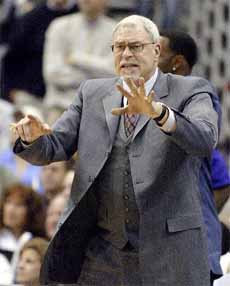At a press meeting in Hege Library, President Kent Chabotar unveiled the move to change Guilford’s athletic status from Division III to Division I. Answering questions from local media, Chabotar announced that these plans had been in formulation for quite some time. “Long have Guilford academics excelled at the behest of college athletics. Yet both have been largely unknown in popular circles,” said Chabotar. “With the national attention we receive as a division I school that is about to change.”
Athletics Department Director Knot Sporty expressed his satisfaction with the decision. Sporty, who is a strong advocate of athletics over academic, believes that Chabotar’s move is one that hints at a sounder philosophy.
“All great schools are founded on great academics,” said Sporty. “But it is their athletic programs that continue the legacy.”
Unlike most schools where only a limited number of teams attain division I status, Guilford plans to initiate all 16 teams into division I level. The department-wide change is part of the Quaker tradition against discrimination.
For tennis player Kent Bounce, times are exciting. He is pleased with the college’s decision and is looking forward to his division I debut match against Stanford University.
“I am practicing 14 hours a day now,” said Bounce, who as a division III athlete would practice 2 hours and 39 minutes every day. “The goal is bigger now, and I am going to make a mark. I am prepared to give whatever it takes.”
In order to facilitate increased practice sessions, Bounce has reduced his course load from 18 to 9 academic hours.
Other athletes are a bit more apprehensive about the added publicity that playing at the division I level will create.
“I don’t even have any designer workout shorts,” said senior Pretty Boy Davis who plays football for the college. “I can’t be seen on ESPN and national networks without Gucci gear.”
Competing at the division I level requires bigger and better practice facilities. Construction of a $100 million Tony Womack Athletics Complex is underway. This project is expected to be completed by July of next year. This facility will house indoor facilities including 16 tennis courts, a football field, a men’s and a women’s soccer field and a state-of-the art track field.
“Rain ruins many practices and athletics events here in the South,” said Sports Information Assistant Director Dave Walters. “By having indoor along with outdoor facilities, we can ensure that our athletes are not affected by freak acts of nature.”
Walters is very pleased with the new sports center, which he believes will be instrumental in increasing student-athlete recruitment. According to him, next year’s class will comprise 80 percent student-athletes.
Walters also added that the athletics department is bidding for better coaches that enhance Guilford’s sporting programs.
“Frankly we have good coaches. These people are devoted to Guilford and we have no doubt about their commitment and dedication,” said Walters. “But in order to compete at this level, we need better.”
Fifteen of the 16 athletic teams will have new coaching staff next year. Golf coach Jack Jensen, who took his team to a division I title, will be on probationary status. Bids for NBA coach Phil Jackson and ACC coaches are underway.
In order to facilitate the upcoming change, athletic teams have asked for more practicing facilities this year. Giving way to increasing demands, college administration has decided to use Frank Family Science Center exclusively for athletic uses.
“Frank Science provides us with the necessary space to conduct logistical planning and strategic team meetings,” said head football coach Kevin Kiesel. “Science is everywhere in nature. It can be conducted and learned everywhere. Sports, on the other, hand need focused facilities.”
In respect for the donors of Frank Science, the College has decided not to change the mission of the building. The building will be used to teach coaching methods to athletes based on the latest scientific technologies.
The building’s new name, Frank Exclusive Center of Scientific Athletics, hints at the new and improved mission.
Science nerds, geeks and professors will be housed in camps near the woods. Kiesel’s squad will ensure the camps are placed in ecological areas where the study of science is most conducive.
Labs will take place in the Hut, with each of the four sciences getting access to the facility one day of the week.
Scholarships will be given to student-athletes that compete on the 16 teams on the basis of merit and need.
“Now we can entice our students with money and not need to call it need-based aid,” said Financial Aid Director Money Mike.
“Unlike in the past, now we won’t have to hide and rename the scholarships we have been giving out to our student-athletes.”
You don’t need to be a rocket scientist to figure this out but… APRIL FOOLS!

